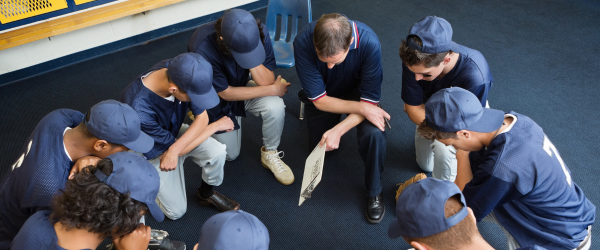Written by Father Tom Simonds, S.J., Director of Secondary Engagement, NCEA, [email protected].
In this blog, through six separate posts, I will be sharing how faculty can develop teaching strategies across the curriculum and across programs using the Four Pillars of the Catechism and other curriculum guides. In this post, I will focus on teaching the faith in school-sponsored sports programs in grades 6 – 8. In my next blog post, I will focus on fine and performing arts and modern languages in grades 6 – 12. Go back to look at my previous posts for ideas for teaching the faith in math, science, language arts and social studies and religious education in grades 6 – 12.
The National Standards and Benchmarks for Effective Catholic Elementary and Secondary Schools (NSBECS) provide best practice goals for Catholic school leaders to benchmark their efforts. In terms of school-sponsored youth sports programs, NSBECS Benchmark 9.3 states, “Co-curricular and extra-curricular activities provide opportunities outside the classroom for each student to further identify and develop gifts and talents and to enhance creative, aesthetic, social/emotional, physical, and spiritual capabilities.” It seems to me that we have work to do together to align our school-sponsored sports programs with this benchmark of best practice for Catholic schools.
Youth sports have dramatically changed over the last twenty years. Parents and coaches are encouraging middle school kids to specialize in one sport and to practice and play that sport year-round on both school and club teams. Somewhere along the line, we have begun to take the fun out of middle school sports and focus too much on how participation in sports can result in financial benefits for college and beyond for kids.
The pressure to be successful is causing stress in students. The rising costs to participate in sports is causing hardship in families and putting participation in sports out of the reach of kids whose families struggle to make ends meet. An overemphasis on sports can also hurt kids and families spiritually as they focus their time, money and talents on sports to the detriment of family time, prayer time and time with their faith community.
Middle school administrators, teachers and coaches can turn the tide and ensure that school-sponsored sports programs are beneficial for kids. I recommend that every elementary and middle school principal read Play Like a Champion. In this book, published by NCEA, the authors provide support for my assertions about the cost to kids and families of the current unhealthy sports climate. The authors also provide lesson plans, called 5-Minute Game Plans, that coaches can use to integrate faith and values education into sports programs.
By changing the focus of middle school sports programs, Catholic education leaders and coaches can enhance kids’ enjoyment of sports. Through participation in healthy sports programs, kids will develop social skills, develop physically in age-appropriate ways and grow in their Catholic faith as well.
Here are some examples of how coaches can support the healthy growth and development of kids through middle school sports programs. All of these examples are shared in Play Like a Champion, and more details for each example can be found in the book.
- Take five minutes during a sports practice and use a scripture quote to teach kids important virtues, life lessons and faith knowledge
- Prepare some kids to lead the team in prayer
- Attend Mass together as a team with coaches and team members serving in ministry roles during the Mass
- Develop parent education programs to help parents see the benefits of a fun sports program for kids that focuses on participation and virtue development
Here are some additional examples coaches can use to support the healthy growth and faith development of kids participating in middle school sports. These examples are based on the four pillars of the Catechism of the Catholic Church.
- What we believe: Coaches can emphasize how sports provide life lessons about how to remain faithful to virtues and to God in challenging times
- How we celebrate: Coaches can model prayer and Mass attendance to demonstrate to kids the value of these practices
- How we live: Coaches and designated participants can use scripture quotes for prayer that speak of virtuous life lessons
- How we pray: Coaches and designated participants can teach team members basic Catholic prayers and use these prayers regularly during practices and games
I invite you to return to this blog for future posts. In my next post I will discuss how teachers can share the faith through fine and performing arts and modern languages in grades 6 – 12.
